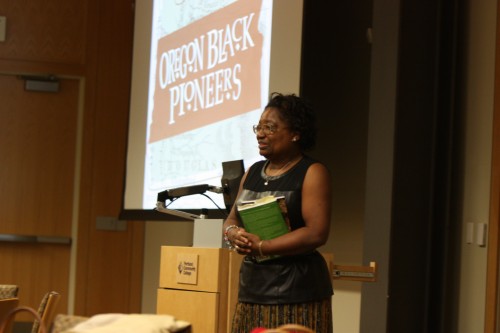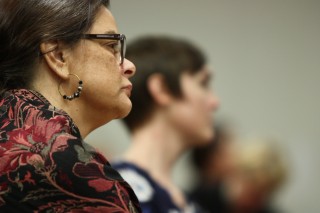This content was published: March 10, 2014. Phone numbers, email addresses, and other information may have changed.
Rock Creek event celebrates Oregon’s first African-Americans
Photos and story by James Hill
In 1788, Marcus Lopez, a cook and cabin boy on the ship Lady Washington, was caught up in a skirmish between its crew and local Native Americans when they docked at Tillamook Bay. Lopez was the only one killed in the brutal fight. What made his death significant was that he was the first recorded African-American to step onto Oregon soil.
When Willie Richardson, president of the Oregon Northwest Black Pioneers in Salem, researched who Lopez was and uncovered more details about his time in Oregon, she discovered a sign in Tillamook that marked that day. However, it never mentioned the significance of his arrival and referred to him as just one of the crew.

Speaking at Rock Creek Campus’ Building 9 Event Center, Willie Richardson highlighted her organization’s effort to tell the stories and history of the first black pioneers.
“The sign in Tillamook had no reference to Lopez as an African-American; just a shipmate,” Richardson said. “It should be changed.”
So Richardson contacted the Oregon Parks and Recreation Department and let them know about the sign and asked whether a change could be made to honor Lopez as Oregon’s first black pioneer. Even though the parks department was sympathetic to Richardson’s desire to change it, they said they couldn’t – the change had to come as part of regular maintenance of the sign.
Richardson’s mission to have Lopez recognized was part of her presentation “Celebrating Oregon’s Black Pioneers” at PCC’s Black History Month Celebration during February. Richardson was just one of many important speakers that were brought to PCC. Also, speaking at events across the district were the Honorable Adrienne Nelson, judge with the Multnomah County Circuit Court; Joseph White, professor emeritus at University California-Irvine; and S. Renee Mitchell, an award-winning writer and performer, to name some.
Speaking at Rock Creek Campus’ Building 9 Event Center, Richardson highlighted her organization’s effort to tell the stories and history of the first black pioneers. Established in 1993, Oregon Northwest Black Pioneers has devoted itself to education and research on this subject. It was instrumental in uncovering 40 unmarked graves in Salem of blacks from the pioneer era in 2007. Since that discovery, Richardson has been researching black pioneers from all over Oregon. As a result, her organization has published the books “African Americans in Portland,” and “Perseverance.”
“We decided that instead of just relying on the bits and pieces of information that is already out there that we would really take as an organization a really deep look at Oregon’s African-American history,” Richardson told the crowd. “And through that process, and very early on in that stage, we learned that a lot of the information that was being floated around was less than accurate. We then decided that we should go about to correct the information.”

Richardson’s presentation continued to cover what we don’t know about Oregon’s past and what has been left out of the history books.
Her presentation continued to cover what we don’t know about Oregon’s past and what has been left out of the history books. She talked about the black guides of the time that have largely gone unnoticed by historians and the fact that Oregon claimed to be a slave free state. It really wasn’t as it had passed laws that ordered any African-Americans in the state to leave as soon as possible or face lashings.
“In reality, Oregon was a slave state just like any other Southern state,” she said.
Other revelations included the fact that black pioneers settled in 32 out of Oregon’s 36 counties. As proved by the ships’ manifests and stories told by Native Americans, slaves were commonly used as labor on vessels like the Lady Washington, which served local mines. Bottomline: it was inevitable that blacks would settle into Oregon during the time of the pioneers.
“Somebody had to do the work and generally it was a slave,” she added.
And one of those slaves was Marcus Lopez, the man killed in the fight in what was known as “Murderer’s Bay.” Recently, Richardson got a call from the Oregon Parks and Recreation Department about that sign in Tillamook.
“Very soon after I contacted them there was some wind storm that came through Tillamook and the sign that went down was this one,” she said. “To me, this was divine intervention. (The fight) is the first documented instance of an African being in the state of Oregon and today that sign now refers to Lopez as an African-American.”


Great featured article. How can I get a copy of the book?
Here is the URL for Books from Oregon Black Pioneers:
http://www.oregonnorthwestblackpioneers.org/books.htm
Thanks for the continued recognition of the historical significance people of color have made in the contribution of Oregon’s history.